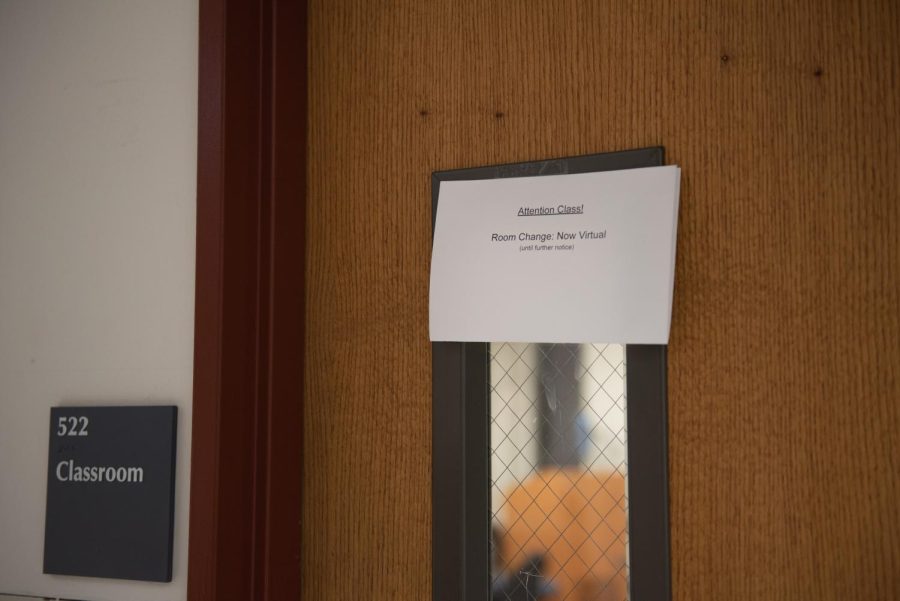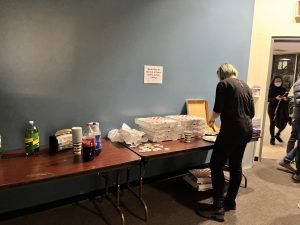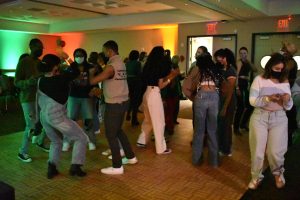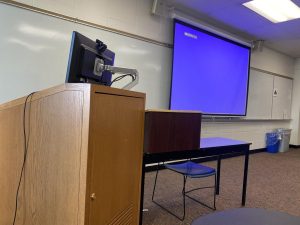Professors Pivot to Online Instruction
Faculty members cite the omicron variant and wanting to quarantine as reasons for holding classes virtually
Although the university maintained that classes would all be in-person, some professors have moved instruction online.
February 17, 2022
At the start of the spring semester, the university affirmed all courses at Fordham would continue to take place in person, despite the rise in cases with the omicron variant. However, some Fordham professors have deviated from those guidelines out of concern for their own health and the safety of their students.
Current university guidelines specify that professors are only allowed to teach virtually under certain circumstances, such as testing positive for COVID-19 or being prompted by VitalCheck to quarantine. The Undergraduate Faculty Handbook details additional reasons for professors to hold classes online, such as needing to stay home with a child who is in quarantine.
Outside of these guidelines, professors are expected to hold all classes in person, with the exception of some extenuating circumstances allowing professors the ability to teach remotely on a case-by-case basis. Robert Moniot, associate dean of Fordham College at Lincoln Center (FCLC), said in one case a professor was stuck in a foreign country for reasons unrelated to COVID-19 and was granted the ability to teach remotely for up to two weeks.
“They did not request permission to do so. If they had, I would not have granted permission.” Robert Moniot, associate dean of FCLC
Moniot added that uneasiness about teaching in person does not qualify as a circumstance for a professor to conduct classes online.
“I received a couple of emails from faculty who clearly felt uneasy about returning but did not meet the guidelines for going to virtual modality,” he said. “They did not request permission to do so. If they had, I would not have granted permission.”
Despite these specifications, a number of Fordham faculty members have taken it upon themselves to hold class online when they felt it was safest to do so. A professor in the communications and media studies department, who is choosing to remain anonymous due to fear of losing their position, said they held the first meetings of their classes online because of concerns about the omicron variant.
“The administration has pushed for in-person classes always, but there are times when I think Zoom is the better option,” the professor said. “The other issue is that we are just beginning to understand Omicron. While our administration believes that the symptoms are mild, that’s not what I am hearing, even from younger people.”
Although this professor began teaching their classes online this semester, they have since returned to in-person instruction due to a lower number of COVID-19 cases at Fordham Lincoln Center. As of Feb. 15, there are 14 cases at the Lincoln Center campus.
Another professor in the communications and media studies department, who is also choosing to remain anonymous for fear of losing their position, decided to teach one of their classes online during the first week of the semester in order to isolate after traveling.
“I actually had to fly that weekend for a family emergency,” the other professor said. “I made the decision to isolate on my return for a few days to be sure I did not bring COVID-19 back into my home.”
“The problem is that there is not an understanding of individual circumstances or an expression of trust in faculty to negotiate these issues with students.” anonymous professor
The professor held one class online during this self-imposed isolation period. They said that they believe current university guidelines limit professors in their ability to choose their quarantine protocols in situations such as this.
“I do not believe the policy outlined by the administration allows flexibility for professors to make decisions to pivot to online instruction based on more personalized risk exposure or other safety reasons,” they said. “The problem is that there is not an understanding of individual circumstances or an expression of trust in faculty to negotiate these issues with students.”
Other professors at FCLC have sought resources to implement a hybrid or Zoom format for their courses. Fleur Eshghi, associate vice president for Instructional Technology Academic Computing at Fordham, said her department has responded to requests from professors looking to utilize classroom technology that allows for hybrid modality.
“Now that we have online options, the class meeting could be rescued by offering it online.” Laura Auricchio, dean of FCLC
“Faculty are in constant contact with us regarding the use of the technology in the classrooms and online, trouble shootings, and other technology requests, etc. We respond to them via many venues, such as email, phones, or requests via the Helpdesk,” Eshghi said.
While professors are still not encouraged to teach virtually outside of the current guidelines, Laura Auricchio, dean of FCLC, said she sees remote instruction as an ongoing opportunity for professors to hold classes that would have otherwise been canceled.
“I could imagine that there might be other circumstances in which a faculty member might move a class meeting online if the only other alternative were to cancel the meeting,” she said. “In the past, such a person might have had to cancel the class; now that we have online options, the class meeting could be rescued by offering it online.”














